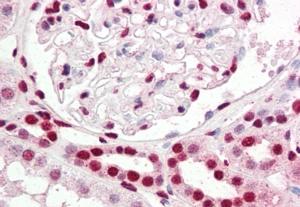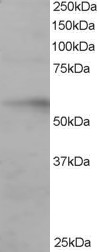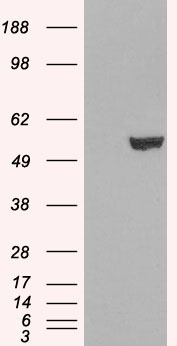Goat Anti-IRF6 Antibody
Peptide-affinity purified goat antibody
- SPECIFICATION
- CITATIONS
- PROTOCOLS
- BACKGROUND

Application
| WB, IHC, E |
|---|---|
| Primary Accession | O14896 |
| Other Accession | NP_006138, 3664, 54139 (mouse) |
| Reactivity | Human |
| Predicted | Mouse |
| Host | Goat |
| Clonality | Polyclonal |
| Concentration | 0.5 mg/ml |
| Isotype | IgG |
| Calculated MW | 53130 Da |
| Gene ID | 3664 |
|---|---|
| Other Names | Interferon regulatory factor 6, IRF-6, IRF6 |
| Format | 0.5 mg IgG/ml in Tris saline (20mM Tris pH7.3, 150mM NaCl), 0.02% sodium azide, with 0.5% bovine serum albumin |
| Storage | Maintain refrigerated at 2-8°C for up to 6 months. For long term storage store at -20°C in small aliquots to prevent freeze-thaw cycles. |
| Precautions | Goat Anti-IRF6 Antibody is for research use only and not for use in diagnostic or therapeutic procedures. |
| Name | IRF6 |
|---|---|
| Function | Probable DNA-binding transcriptional activator. Key determinant of the keratinocyte proliferation-differentiation switch involved in appropriate epidermal development (By similarity). Plays a role in regulating mammary epithelial cell proliferation (By similarity). May regulate WDR65 transcription (By similarity). |
| Cellular Location | Nucleus. Cytoplasm Note=Translocates to nucleus in response to an activating signal |
| Tissue Location | Expressed in normal mammary epithelial cells. Expression is reduced or absent in breast carcinomas |

Thousands of laboratories across the world have published research that depended on the performance of antibodies from Abcepta to advance their research. Check out links to articles that cite our products in major peer-reviewed journals, organized by research category.
info@abcepta.com, and receive a free "I Love Antibodies" mug.
Provided below are standard protocols that you may find useful for product applications.
Background
This gene encodes a member of the interferon regulatory transcription factor (IRF) family. Family members share a highly-conserved N-terminal helix-turn-helix DNA-binding domain and a less conserved C-terminal protein-binding domain. Mutations in this gene can cause van der Woude syndrome and popliteal pterygium syndrome. This protein is involved in palate formation.
References
IRF6 polymorphisms are associated with nonsyndromic orofacial clefts in a Chinese Han population. Pan Y, et al. Am J Med Genet A, 2010 Aug 26. PMID 20799332.
Genetic variants in COL2A1, COL11A2, and IRF6 contribute risk to nonsyndromic cleft palate. Nikopensius T, et al. Birth Defects Res A Clin Mol Teratol, 2010 Jul 29. PMID 20672350.
Evidence of gene-environment interaction for the IRF6 gene and maternal multivitamin supplementation in controlling the risk of cleft lip with/without cleft palate. Wu T, et al. Hum Genet, 2010 Oct. PMID 20652317.
Maternal genes and facial clefts in offspring: a comprehensive search for genetic associations in two population-based cleft studies from Scandinavia. Jugessur A, et al. PLoS One, 2010 Jul 9. PMID 20634891.
MTHFR and MSX1 contribute to the risk of nonsyndromic cleft lip/palate. Jagom脌gi T, et al. Eur J Oral Sci, 2010 Jun. PMID 20572854.
If you have used an Abcepta product and would like to share how it has performed, please click on the "Submit Review" button and provide the requested information. Our staff will examine and post your review and contact you if needed.
If you have any additional inquiries please email technical services at tech@abcepta.com.













 Foundational characteristics of cancer include proliferation, angiogenesis, migration, evasion of apoptosis, and cellular immortality. Find key markers for these cellular processes and antibodies to detect them.
Foundational characteristics of cancer include proliferation, angiogenesis, migration, evasion of apoptosis, and cellular immortality. Find key markers for these cellular processes and antibodies to detect them. The SUMOplot™ Analysis Program predicts and scores sumoylation sites in your protein. SUMOylation is a post-translational modification involved in various cellular processes, such as nuclear-cytosolic transport, transcriptional regulation, apoptosis, protein stability, response to stress, and progression through the cell cycle.
The SUMOplot™ Analysis Program predicts and scores sumoylation sites in your protein. SUMOylation is a post-translational modification involved in various cellular processes, such as nuclear-cytosolic transport, transcriptional regulation, apoptosis, protein stability, response to stress, and progression through the cell cycle. The Autophagy Receptor Motif Plotter predicts and scores autophagy receptor binding sites in your protein. Identifying proteins connected to this pathway is critical to understanding the role of autophagy in physiological as well as pathological processes such as development, differentiation, neurodegenerative diseases, stress, infection, and cancer.
The Autophagy Receptor Motif Plotter predicts and scores autophagy receptor binding sites in your protein. Identifying proteins connected to this pathway is critical to understanding the role of autophagy in physiological as well as pathological processes such as development, differentiation, neurodegenerative diseases, stress, infection, and cancer.




